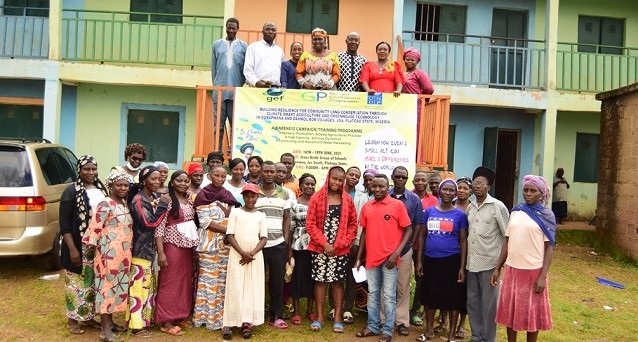The increasing need to foster community education on the relationship between climate change and agriculture recently motivated a non-profit group known as Sustainable Environment and Fisheries Foundation (SEFFA) to train and empower farmers on climate smart agricultural practices.

Participants who gathered for the event that took place on Saturday, June 19, 2021 in Jos, Plateau State, were sensitised on the causes of extreme weather conditions and how they can adopt simple farming methods to tackle them.
With special focus on how to help lift them out of poverty, they were tutored on fish farming and processing as an alternative livelihood source.
The smallholder groups were additionally taught the basis of nursery production, group dynamics, as well as household water harvesting to enhance their capacities to transform their lives.
To put an end to this problem, the organiser of the event believes that it starts and ends with farmers’ awareness.
Moving further from enlightenment is the need to provide the farmers with inputs to help them withstand some of the climatic challenges bedeviling food production and environmental sustainability.
Founder and Chief Executive Officer of the organisation, Mrs. Ololade Adegoke, disclosed that her desire is to be in a position where she can give inputs to farmers.
“Little things like fertilisers and seeds,” according to her, “help.”
In demonstration of this gesture, her establishment has formed two communities – Gurapwana and Dahwol Bob – into small corporate entities and gave them 100 improved varieties of mango seeds to enable them put what they have learnt into practice.
The aquaculture specialist made it clear that these groups have their independent accounts that are jointly managed by both villages to avoid any form of unnecessary influence that could prevent the farmers from raising the required capital to grow their businesses.
She urged more stakeholders particularly the international community to come on board and do more in promoting farmers’ education and empowerment to genuinely help them build resilience to conserve land through climate smart agriculture and greenhouse technology.
In addition to the training and empowerment scheme, she hinted that SEFFA also introduced the greenhouse project as a practical business model to enable the beneficiaries transform their knowledge into a money spinner.
For her, the summary of her message is to teach everyone the importance of how every small act can make a difference in the world.
Other experts who spoke at the parley were more interested on how to inspire the farmers to access the available information to solve many of the existing setbacks hampering sustainable agro activities and environmental protection.
For them, the real burden is not on information availability alone, rather it critically depends more on the farmer’s zeal to source and make use of it.
Dr. Lateef Folorunsho holds the view that it is the effort and interest of the farmer that can best help remedy this challenge.
“The long and short of it is just a personal thing for them to say let me wake-up and search for information,” he said.
The Ahmadu Bello University lecture advised that a country like Nigeria needs to preserve its traditional farming knowledge such as integrated pest management and combine it with careful scrutiny of mechanisation to guarantee sustainable and smart agriculture practice.
He submitted that it is going to take a long time for the world to experience any significant benefit of the ongoing climate advocacy because of the long term devastation on the environmental.
One of the trainees, Mrs. Sarah Buchan, lauded the organisers for conceptualising this idea to engage with community farmers on the challenges affecting them and their livelihoods.
She testified that the programme has opened her mind to some of the problems troubling her and the steps to follow to nip the situation in the bud.
“My desire for the community,” she revealed, “is for them to understand the importance and why SEFFA is coming in.”
Mrs. Buchan, who serves as a treasurer to one of the cooperative groups, narrated that her confidence is anchored on the premise that the villages will put in more enthusiasm to resolve the crisis if their understanding is properly enhanced on the issues.
According to Mrs Adegoke, 100 mango seedlings, soybean, groundnut, maize and rice from ABU were distributed, with each farmer getting 5kg of each item.
“The villages were agog with joy because of the timeliness,” she said, adding that this was the second batch.
The initiative, tagged: “Building resilience for community and conservation through climate smart agriculture and greenhouse technology in Gurapwana and Dahwol-Rob Villages, Jos, Nigeria”, is being supported by the United Nations Development Programme – Global Environment Facility (UNDP-GEF) Small Grants Programme (SGP)
By Etta Michael Bisong, Abuja
